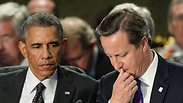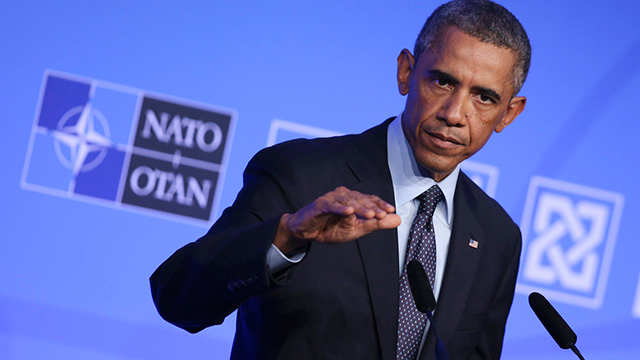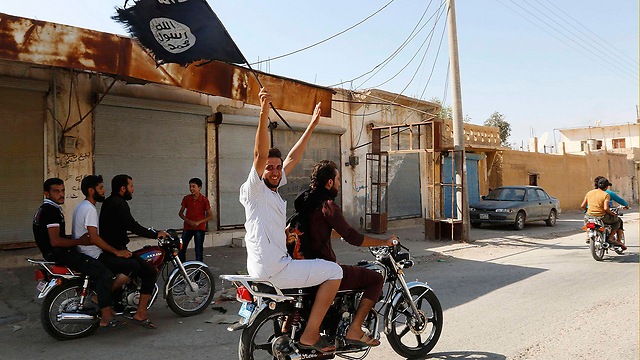
The US and nine key allies agreed Friday that the Islamic State group is a significant threat to NATO countries and that they will take on the militants by squeezing their financial resources and going after them with military might.
With the Islamic State militants spreading across eastern Syria and northern and western Iraq, President Barack Obama noted that the moderate Syrian rebels fighting both the group and the government of Bashar Assad are "outgunned and outmanned." In addition to the action pledged by fellow NATO leaders, he pressed Arab allies to reject the "nihilism" projected by the group.
The new NATO coalition will be able to mount a sustained effort to push back the militants, Obama said. The US secretaries of State and Defense, meeting with their counterparts at the international gathering, insisted the Western nations build a plan by the time the UN General Assembly meets this month.
"I did not get any resistance or pushback to the basic notion that we have a critical role to play in rolling back this savage organization that is causing so much chaos in the region and is harming so many people and poses a long-term threat to the safety and security of NATO members," Obama said at the summit conclusion. "So there's great conviction that we have to act, as part of the international community, to degrade and ultimately destroy ISIL, and that was extremely encouraging."
Laying out a strategy for Iraq, Obama hinted at a broader military campaign, likening it to the way US forces pushed back al-Qaeda along Pakistan's border with Afghanistan, taking out the group's leadership, shrinking its territory and pounding at its militant followers. To do that, the US used persistent airstrikes, usually by CIA drones.
So far, US airstrikes in Iraq have been largely limited to helping Kurdish forces and protecting refugees. But Obama has set a goal of dismantling and destroying the Islamic State, and said Friday that the US will continue to hunt down the militants just as it did with al-Qaeda and with al-Shabab in Somalia.
Secretary of State John Kerry heads to the Middle East next week, and he expects to expand the coalition beyond Western nations.
Said Obama: "I think it is absolutely critical that we have Arab states and specifically Sunni-majority states that are rejecting the kind of extremist nihilism that we're seeing out of ISIL, that say that is not what Islam is about and are prepared to join us actively in the fight."
The Islamic State group espouses a radical form of Sunni Islam and initially invaded Iraq to fight its Shiite government.
"What we can accomplish is to dismantle this network, this force that has claimed to control this much territory, so that they can't do us harm," Obama said. He added that US ground troops in Syria are not needed to accomplish the goal, but instead can work with moderate partners on the ground in the country.
"They have been, to some degree, outgunned and outmanned. And that's why it's important for us to work with our friends and allies to support them more effectively," Obama said.
In a meeting with the foreign and defense ministers from the coalition countries, Kerry said leaders need a clear idea about what each country will contribute to the fight. And, while noting that many won't be willing to engage in military strikes, he said they can instead provide intelligence, equipment, ammunition or weapons.
"We very much hope that people will be as declarative as some of our friends around the table have been in order to be clear about what they're willing to commit, because we must be able to have a plan together by the time we come to (the United Nations General Assembly)," said Kerry. "We need to have this coalesce."
Defense Secretary Chuck Hagel, sitting alongside Kerry, said the group forms a loose coalition that will be needed to face the insurgent challenge. He said the group can then be expanded. Along with the United States, the coalition comprises the United Kingdom, France, Australia, Germany, Canada, Turkey, Italy, Poland and Denmark.
Later, French President Francois Hollande said France was discussing with allies what type of action might be taken. "France is ready to act, but once the political accord is there and in respect to international law," Hollande said.
A senior Obama administration official said Thursday that the US wanted to establish a credible ground force in Syria by training more moderate rebels before taking military action there. A $500 million request is pending in Congress.
One prong of a Western coalition approach would be for the nations' law enforcement and intelligence agencies to work together to go after the Islamic State's financing — both in banks and more informal funding networks. But as long as the Islamic State has access to millions of dollars a month in oil revenue, it will remain well-funded, US intelligence officials say.
NATO Secretary General Anders Fogh Rasmussen said NATO has agreed to help coordinate assistance to Iraq. And he said NATO would consider putting together a mission to train and increase the capabilities of the Iraqi forces. NATO did training during the Iraq war.
NATO also agreed to increase cooperation among nations on sharing information about foreign fighters. A number of nations, including the US, have noted that radicalized citizens have been traveling to Syria and Iraq to fight, raising alarms that they could return to their home countries and launch attacks.
Denmark's Foreign Minister Martin Lidegaard said the effort against the militants "is not only about a military effort, it is also about stopping the financial contributions to ISIS, to coordinate intelligence, it is about stopping foreign fighters, young people from our own societies. It is decisive that we get more countries along."

















